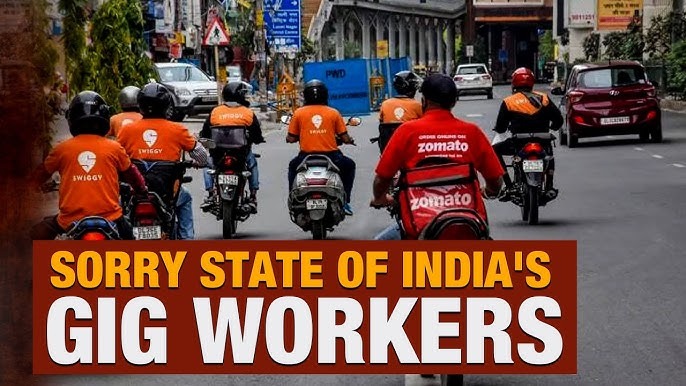
Follow WOWNEWS 24x7 on:

As India races to formalize its booming gig economy, a new wave of regulation is reshaping the landscape for millions of workers who power food delivery, ride-hailing, logistics, and home services. While the spotlight remains fixed on tech platforms and state-level policy moves, the silent sufferers of this crackdown are the gig workers themselves—many of whom continue to operate without basic protections, income stability, or recognition. From Bengaluru’s flooded streets to Delhi’s heatwaves, these workers remain the invisible backbone of India’s digital-first economy, braving harsh conditions with little support.
Key developments across states and sectors reveal a widening gap between policy intent and lived realities.
1. The regulatory push: Karnataka leads, others lag
- Karnataka has passed the Platform-Based Gig Workers (Social Security and Welfare) Bill, 2025, establishing a welfare board, dispute resolution mechanisms, and a fund supported by aggregator fees
- Rajasthan remains the only other state with a formal gig worker welfare law, passed in 2023
- The bill mandates registration of workers and platforms, income security provisions, and occupational safety standards
- However, implementation hurdles remain, and the bill still awaits passage through the legislative council
2. The human cost: stories from the street
- Narayan Malik, a Swiggy delivery partner in Delhi, works 12-hour shifts through extreme weather, earning barely ₹1,000 a day before fuel costs
- He pays for his own uniform and delivery gear, with no reimbursement from platforms
- Malik’s accident last year left him with a lingering leg injury, yet he continues working to support his bedridden parents, wife, and newborn
- Classified as a “partner,” he is treated as a business entity, paying TDS and bearing all operational costs without employee benefits
3. MSMEs and the gig economy: the overlooked link
- India’s 5.9 crore registered MSMEs employ over 25 crore people and contribute nearly half of the country’s exports
- Many MSMEs rely on gig workers for seasonal, project-based, or last-mile roles—from delivery personnel and freelance designers to tutors and photographers
- The crackdown on platform-based gig work risks disrupting this informal but vital supply chain, especially for small businesses that depend on flexible labor models
- MSMEs are expected to drive future gig job demand in sectors like manufacturing, logistics, and personal services
4. Policy gaps and definitional confusion
- The Code on Social Security, 2020 defines gig workers as those earning outside traditional employer-employee relationships
- However, the lack of clarity on who qualifies and what protections apply has led to inconsistent enforcement
- The Periodic Labour Force Survey still does not identify gig workers as a distinct category, making data collection and policy targeting difficult
- NITI Aayog projects the gig workforce to grow to 2.35 crore by 2029–30, yet most remain outside formal labor protections
5. Platform practices under scrutiny
- Platforms like Swiggy, Zomato, Ola, and Uber classify workers as partners, avoiding obligations like paid leave, health insurance, or minimum wage
- Commission structures, fuel costs, and GST deductions eat into earnings, leaving workers with little take-home income
- Incentives are often tied to unrealistic targets, and workers must pay upfront for gear and onboarding fees
- The flexibility touted by platforms rarely translates into financial security or work-life balance
6. The road ahead: what needs fixing
- States must accelerate the rollout of welfare boards and dispute resolution mechanisms
- Aggregators should be mandated to share the cost of gear, insurance, and training
- MSMEs need tailored support to integrate gig workers without losing operational flexibility
- National surveys must include gig work as a formal category to enable better policy design
- Worker voices must be included in shaping regulations, ensuring that reforms reflect ground realities
India’s gig economy is at a crossroads. While regulation is long overdue, the current crackdown risks sidelining the very people it aims to protect. For millions of gig workers, the promise of flexibility has come at the cost of dignity, safety, and stability. It’s time to rewrite the rules—with workers at the center.
Sources: India Today, Outlook India, New Indian Express, MSN News, Economic Times


